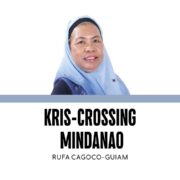Corruption and compassion: Same difference

When people talk about corruption, it often sounds like an old song, played too often, yet no one truly listens. It fills our daily lives like background noise. We hear it on the news, see it on social media, and talk about it in jeepneys and sari-sari stores, where everyone has something to say but nothing truly changes. We shake our heads, we post online, and then life goes on.
For most Filipinos, corruption feels like a distant word, something that happens only in the halls of power. But for the indigenous people (IPs) and Muslim communities in the South, corruption is not a word. It is a wound. It is the reason why bridges stop halfway, why classrooms are empty, why health centers have no medicines, and why dreams fade before they even begin.
I grew up seeing this difference—and how, in truth, the difference is the same. The powerful grow richer. The poor grow weary. And those who still believe in justice are left wondering if honesty still has a place in this country.
That is what corruption does. It makes people think fast, but hearts that feel nothing. You always see it in how clever talk is praised, even when conscience is missing. In offices and barangay halls, the lesson is the same: power seems to matter more than people, and paper somehow matters more than lives.
In many far-flung areas in Mindanao, it does not come as a luggage full of cash. It shows up in other ways—empty classrooms, missing textbooks, cracked water pipes, roads that stop in the middle of nowhere, and scholarships that never arrive. It is there in every promise that dies before it reaches the mountains, in every relief good that never reaches evacuees, in every ancestral claim still waiting on a desk somewhere.
For people who already have so little, corruption steals even their hope. When budgets disappear, so do dreams. When leaders steal, they do not just take money; they take away children’s trust that leaders can be good. And that loss, I think, hurts more than any missing peso ever could.
In marginalized communities, where people have learned to live with silence, the story is different yet the same. Families survive on faith and dignity even when the world forgets them. They continue to farm, weave cloth, and fish in waters that are no longer theirs. And yet they remain generous. They share what little they have, they smile through struggle, and they still pray for peace.
I have met elders who still remember the days when learning to read was seen as a threat. And yet, through stories passed from one generation to another, they preserved them, including their language, including their courage. In their eyes, you can see what true education looks like. And they are not in diplomas, not medals, but the quiet strength to endure.
Meanwhile, those who sit in high offices speak loudly about progress, while the people at the margins are still waiting for justice. Every year, we hear the same speeches, the same promises of change. Every election, we see the same faces, the same smiles. Only the slogans change.
We have reached a point where corruption no longer shocks us. It has become part of our routine, like brownouts, earthquakes, or floods. We laugh about it, make memes about it, and then move on. However, the people in the uplands, coastal villages, and conflict zones cannot simply move on. Corruption steals the very ground beneath their feet.
And yet, despite everything, they remain the most generous. In communities where money is scarce, people still share rice, still offer coffee, still open their doors to strangers. They have little, but they give much. They have suffered, but they still believe in the kindness of others.
Sometimes, I wonder how they keep their hearts so full when others, who already have so much, remain empty. Perhaps it is because wisdom resides in simplicity, and compassion flourishes where truth is not compromised for a position.
As we celebrate Indigenous Peoples’ Month, maybe it is time to ask: how can we remedy this? How can we heal a nation whose mind runs fast but whose heart beats slow?
Maybe the answer is not in new laws nor loud speeches. Maybe it starts in listening again to the silent stories of the IPs and Muslims who have long carried the nation’s forgotten soul. They are the ones who, despite injustice, continue to live with honesty, humility, and hope.
If we truly want change, we must remember that integrity cannot be taught by seminars. It grows when we choose conscience over convenience, heart over ego, and people over power.
Because in the end, corruption and compassion are born from the same difference—the choices we make when no one is watching. And maybe that is where hope begins: when we realize that even in a country where corruption has become normal, honesty can still be an act of quiet rebellion.
—————-
Francis “Isko” N. Reginio is an academic and social advocate specializing in policy analysis, human capital development, and community empowerment.

















Six rules for navigating the new abnormal